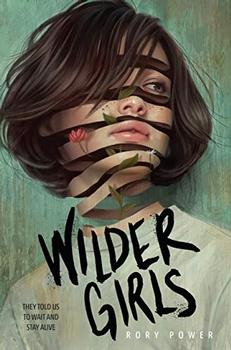Summary | Excerpt | Reading Guide | Reviews | Beyond the book | Read-Alikes | Genres & Themes | Author Bio

National Book Award winner M. T. Anderson returns to future Earth in a sharply wrought satire of art and truth in the midst of colonization.
When the vuvv first landed, it came as a surprise to aspiring artist Adam and the rest of planet Earth - but not necessarily an unwelcome one. Can it really be called an invasion when the vuvv generously offered free advanced technology and cures for every illness imaginable? As it turns out, yes. With his parents' jobs replaced by alien tech and no money for food, clean water, or the vuvv's miraculous medicine, Adam and his girlfriend, Chloe, have to get creative to survive. And since the vuvv crave anything they deem "classic" Earth culture (doo-wop music, still-life paintings of fruit, true love), recording 1950s-style dates for the vuvv to watch in a pay-per-minute format seems like a brilliant idea. But it's hard for Adam and Chloe to sell true love when they hate each other more with every passing episode. Soon enough, Adam must decide how far he's willing to go - and what he's willing to sacrifice - to give the vuvv what they want.
Certainly Anderson’s novel is a work of speculative fiction, but that’s because it prompts readers to ask their own questions about economic disparities, enforced inequality, ethnocentrism, and (just maybe) art’s ability to shed a clearer light on all of these troubling issues, both in Adam’s world and in our own. Thanks in large part to its slender size, Landscape with Invisible Hand is a novel that lends itself to repeated readings, study, and discussion, as readers contemplate parallels between Adam’s near-future and our own present time, asking themselves what can be done differently and what should be preserved at all costs...continued
Full Review
 (606 words)
(606 words)
(Reviewed by Norah Piehl).
 The title of M.T. Anderson's Landscape With Invisible Hand, (and perhaps its protagonist's name), contains a reference to the theories of the Scottish economist Adam Smith, whose landmark 1776 work The Wealth of Nations laid the groundwork for modern free-market economic theory. To laypeople, Smith may be best known for his concepts of the division of labor and its concomitant increase in productivity, as well as his contention that self-interest and competition result in the greater good for society.
The title of M.T. Anderson's Landscape With Invisible Hand, (and perhaps its protagonist's name), contains a reference to the theories of the Scottish economist Adam Smith, whose landmark 1776 work The Wealth of Nations laid the groundwork for modern free-market economic theory. To laypeople, Smith may be best known for his concepts of the division of labor and its concomitant increase in productivity, as well as his contention that self-interest and competition result in the greater good for society.
This last point is part of what's implied in Smith's famous usage of the term "invisible hand," a metaphor meant to suggest that, in the absence of regulation, human economic self-interest will lead people to act in ...

If you liked Landscape with Invisible Hand, try these:

by Charles Burns
Published 2024
The beloved and award-winning author of Black Hole's haunting and visually arresting story of an artist's obsessions, and the value and cost of pushing the boundaries of creativity.

by Rory Power
Published 2020
A feminist Lord of the Flies about three best friends living in quarantine at their island boarding school, and the lengths they go to uncover the truth of their confinement when one disappears. This fresh, new debut is a mind-bending novel unlike anything you've read before.